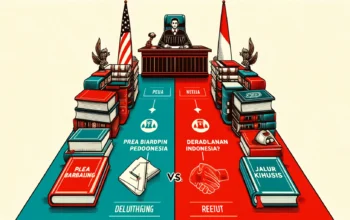Legal Literacy – Understand the Relationship between Binding, Agreement and Contract in Covenant Law and Civil Law. Learn the legal terms of oral and written agreements and the implications in case of default. This article provides a comprehensive understanding of important aspects of the legal world.
By: Defian Putri Tiara
Before answering what is the relationship between engagement, agreement and contract, let’s first analyze the meaning of each of the three.
Engagement
According to BW or the Civil Code, an engagement is a legal relationship between 2 or more parties in which one party is entitled to a performance while the other party is obliged to perform the performance. Article 1233 of the Burgerlijk Wetboek (BW) regulates the source of obligations, which can stem from consent and law.
Article 1233 of the Civil Code states that every obligation is born either by agreement or by law. This indicates that obligations are born because of agreements or laws, in other words, laws and agreements are the source of obligations.
Agreement
Article 1313 of the Civil Code explains that an agreement is an act in which one or more people bind themselves to one or more other people. From the formulation of the Article, it can be concluded that agreements in this context are agreements that give rise to obligations or obligatory agreements. Agreements produce the legal effects desired by the parties involved.
Prof. Subekti, S.H. in his book “The Law of Treaties” states that the relationship between the obligation and the agreement is that the agreement issues an obligation. Agreements give rise to obligations in addition to other sources.
Contract
A contract is an event in which two or more people promise each other to do a certain act, usually in writing. The parties who agree on the matters agreed upon, are obliged to obey and implement them, so that the agreement gives rise to a legal relationship called an obligation (verbintenis).
Thus, a contract can give rise to rights and obligations for the parties that make it, therefore a contract is a formal source of law, provided that the contract is a valid contract.
A contract has a narrower meaning than an agreement. A contract is also an agreement in writing. All contracts must be agreements, because basically there are oral and written agreements. In relation to obligations and agreements, agreements are factors that give rise to obligations.
Valid Terms of Agreement
Article 1320 of the Civil Code states that there are 4 (four) conditions for the validity of an agreement, namely:
- There is an agreement for those who bind themselves.
- The capacity of the parties to enter into an agreement.
- Regarding a certain matter.
- Regarding a lawful cause (causa).
The first and second requirements are called subjective requirements because they relate to the subject of the agreement, while the third and fourth requirements relate to the object of the agreement and are called objective requirements.
Oral and Written Agreements
Agreements can be made in written form or by oral means. Article 1320 of the Civil Code regarding the validity of oral agreements does not regulate the form of an agreement, so that in making an agreement, the community is free to determine its form. Oral agreements also have the legal force to bind the parties who make them, as long as they fulfill the legal requirements of the agreement in Article 1320 of the Civil Code.
However, unlike written agreements that use deeds, oral agreements do not use deeds. Therefore, oral agreements are usually more risky when there is a default by one of the parties.
Relationship between Binding, Agreement, and Contract
In general, obligations can arise from various sources, including agreements. Oleh karena itu, perjanjian merupakan salah satu sumber perikatan.
In the context of civil law, agreements are the most common source of obligation. Agreements can give rise to contractual obligations, namely obligations arising from the agreement of two or more people.
Meanwhile, a contract is an agreement made in writing. Contracts are a special form of agreement, and not all agreements are contracts.
The difference between an engagement, an agreement, and a contract
Here is a table of the differences between an engagement, an agreement and a contract:
Reference
- Syarifah, Nur and Reghi Perdana. 2015. The Law of Treaties. Banten: Open University.
- Harefa, Billy Dicko Stepanus and Tuhana. 2016. THE LEGAL FORCE OF AN ORAL AGREEMENT IN THE EVENT OF DEFAULT. Yogyakarta: Journal of UNS Vol. IV.
- Center for Business Law Studies, Universitas Airlangga, https://fh.unair.ac.id/hukum-bisnis/perikatan-generik-alternatif-fakultatif-dan-kumulatif/
*This article is the personal opinion of the author and does not represent the views of the editorial staff of Literasi Hukum Indonesia.
That is the explanation of the relationship between engagement, agreement, and contract in the Law of Treaties and Civil Law.
Visit the Indonesian Legal Literacy page and follow @literasihukumcom on Instagram to upgrade your legal knowledge!







